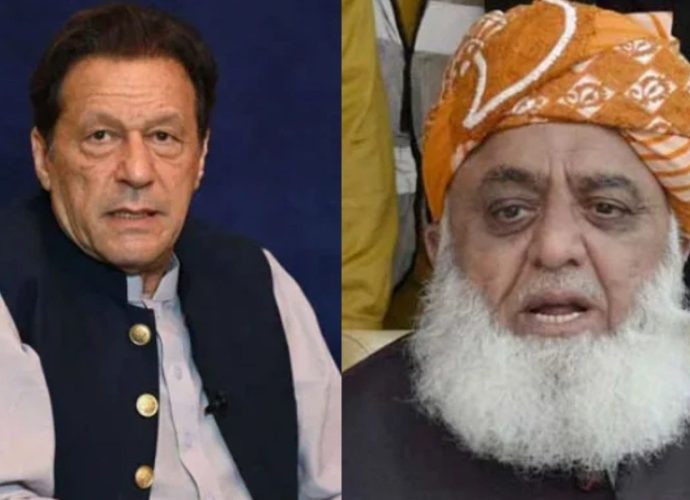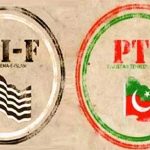RAWALPINDI/PESHAWAR: According to reports on Wednesday, the Pakistan Tehreek-e-Insaf (PTI) has once again established backchannels with Jamiat Ulema-e-Islam-Fazl (JUI-F) as part of its political maneuvers against the government Pakistan Muslim League-Nawaz (PML-N).
PTI leader Salman Akram Raja has reportedly reached out to JUI-F leadership, indicating a wish for discussions amid escalating rumors of possible partnerships, according to sources. But JUI-F has told PTI that Maulana Fazlur Rehman, the party’s leader, is now gone for Umrah.
Both erstwhile adversaries have apparently agreed to meet once Fazl returns, with discussions anticipated as early as next week, despite their cautious and silent actions.
Additionally, on Tuesday, PTI Secretary General Barrister Salman Akram Raja affirmed that Imran Khan, the incarcerated party founding chairman, had given specific directives about the JUI-F head, which will be communicated appropriately.
After meeting with Imran, Salman told the journalists outside Central Jail that talks about the opposition coalition had occurred, but he would not go into specifics. He restated that PTI respected Fazl and wanted him to join the coalition.
Additionally, he attested that Imran had no complaints about the party and that talks about potential future plans had taken place. There have been actions done in this direction, but the former prime minister has not met with his political friends in the last five months.
Raja further chastised certain people for using legal counsel to influence politics and emphasized that those Imran has given responsibility for should continue to concentrate on political matters.
He addressed worries about Imran’s health by denying rumors that were going around and stating that the former prime minister was doing well after a regular examination.
He refuted claims that Imran was being prevented from engaging in religious activities or refused suhoor, the pre-dawn meal for fasting.
“Darkest period”
PTI veteran and Senate Leader of the Opposition Shibli Faraz, meanwhile, declared that the previous governing party was collaborating with other opposition parties in a concerted effort to overthrow the government.
The last year has been the “darkest period” in Pakistan’s history, he told reporters outside the Peshawar High Court (PHC). He went on to say that the administration has spent billions on ads without taking any concrete action and has destroyed legislation like the PECA and the 26th Amendment without following a democratic procedure.
“A reward for turncoats and defectors,” he criticized the growing federal cabinet, adding that the nation was drowning in debt and that inflation was at an all-time high.
Shibli pointed out that Sindh was also experiencing unrest due to water shortages and denounced the deteriorating security situation in Khyber Pakhtunkhwa and Balochistan. “After Eid, we will take to the streets to protest this inept government,” he said, adding that PTI is getting ready for court cases.
At a different news conference, Omar Ayub Khan, the Leader of the Opposition in the National Assembly, criticized the government’s first-year performance and questioned Prime Minister Shehbaz Sharif’s assertions of economic stability.
“Where is the stability? We definitely don’t see it,” he added, adding that the nation was in terrible shape, with an industrial shutdown, a catastrophic economic recession, and a faltering agricultural sector.
He said that the telecom and IT industries had lagged behind, wheat production was in difficulty, and services were getting worse. “The economy is shrinking, and we are going through one of the worst financial periods in history,” Ayub said.
Pakistan’s external debt has grown by Rs120 billion as a result of currency devaluation, Ayub remarked, bemoaning the rupee’s decline. He added that debts of Rs 2,930 billion had been rescheduled and that the general public will be heavily burdened by repaying them.
With only three months remaining in the fiscal year, he bemoaned the fact that only Rs92 billion of the Rs1,400 billion that had been allotted had been spent, or barely 8% of the total.
Ayub further said that the government is still unable to address the situation, despite capacity payments in the electricity industry surpassing Rs2,000 billion.
Given that foreign direct investment (FDI) has fallen to a 50-year low, he questioned the Special Investment Facilitation Council’s (SIFC) effectiveness and openness. Meanwhile, foreign exchange reserves have dropped to $11 billion, and $350 million was paid to a US corporation for the repair of F-16 planes.
“Terrorism is rising at an alarming rate across the country, with Balochistan witnessing daily attacks,” he stated. “Security forces cannot even enter certain areas, and instead of focusing on militants, intelligence agencies are busy monitoring political opponents,” he said.



